It is in a feline’s instinct to be very aware of its surroundings. It helps them to feel safe and secure regardless of where they live. For domesticated cats, when you find them sleeping at the end of your bed or snuggled at your feet, it’s a sign that she not only feels safe with her surroundings but that she’s also protecting her owner.
What to Expect with a New Cat in the Home
When you decide to bring a pet into your home, it soon becomes an integral part of your family. Some folks even consider their pets as their children.
Many professionals even say that cats especially provide a beneficial sense of psychological support to those who are prone to having depression or stress issues. When your cat lies on your chest and purrs while you pet her, it can calm you if you are having a particularly stressful day.
If you have a cat or read a lot about them if you are deciding whether to get one as a pet, you may read that cats are more dominating and provide less companionship than a dog. This is actually a myth. Cats provide unconditional love and loyalty; at the same time, they seem to have some odd ways of showing it.
[amazon bestseller=”cat sleeping pad”]
Felines are very sociable while also being very possessive and territorial. You may find that your cat sees every space in your home as their territory. Whether you bring a new kitten or an adult cat into your home, she will inspect every nook and cranny of the house.
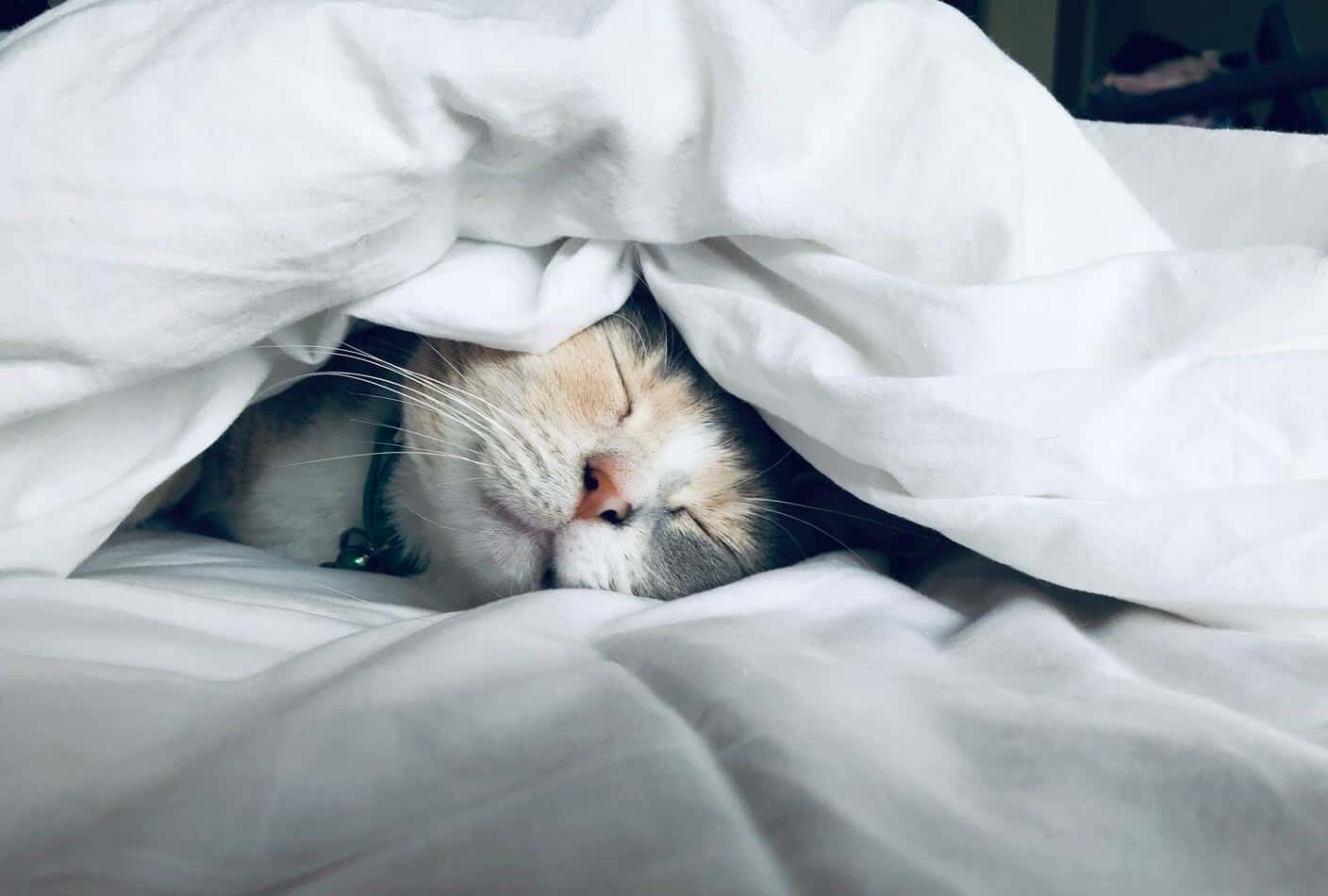
This is an instinctive behavior and helps your cat understand and feel comfortable in their new surroundings. Eventually, your cat will choose her favorite place to sleep during the day, as they can sleep up to 16 hours every day. It will be where she feels the most secure while she is also the most vulnerable.
Moreover, at night when it is time for you to go to sleep, your bed is not off-limits to your little feline friend. Here are seven reasons why your kitty will hop up and snuggle at the foot of your bed at night:
1. Feline Survival Instincts
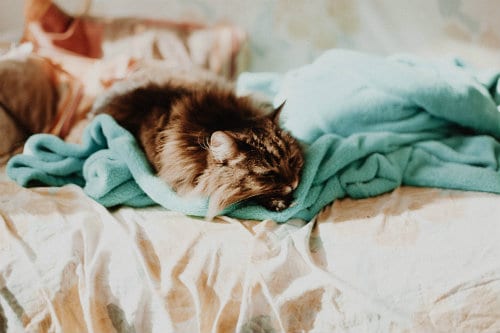
Cats feel the need to be close to the one who provides for them and will tend to favor the one who feeds her, keeps her litter box clean and gives her the most attention during the day. It gives her a feeling of safety to be near her caregiver at night, but she also wants to avoid being rolled over on in the middle of the night.
By nature, your cat will most likely curl up at the foot of the bed near your feet. This location makes sense to your cat since it provides the greatest chance of escape in an emergency.
2. Instinct to Protect You
Felines are protective creatures but they also know they are the most vulnerable when they are also sleeping. By being close to you during the night, they not only feel safer, but they also know they can protect you and wake you if they sense any danger.
If you feel your cat snuggle up with her back against your feet or legs, it is because she sense that she feels better protected in that position, and has an easier and faster reaction time should she need to escape quickly.
3. Cats and Their Territorial Instinct
Do you own your cat or does your cat own you? Sometimes it is difficult to tell with all of a cat’s unique behaviors. Another reason your cat may sleep close to you at night is to claim her territory. She is telling you that she is allowing you to sleep with her, not the other way around.
4. There Is More Room in Their Human’s Bed
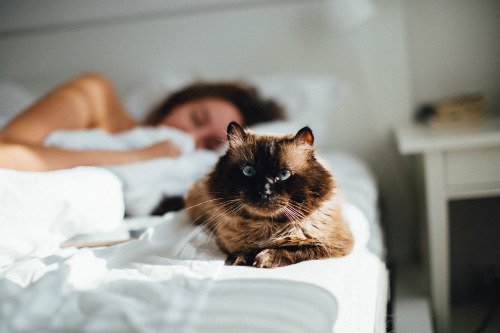
Cats will often walk around the location where they want to sleep and knead the cushions of a sofa, chair or their bed. Because a human’s bed is bigger, that means more room for her to knead around before settling in.
[amazon bestseller=”cat sitting post”]
Cats still need a bit of space between themselves and their humans, and there is more space at the foot of the bed to move around while still being in close contact with you.
You may feel your cat kneading your legs too while kneading the mattress and covers. When she finally settles down, she may actually lay on top of your legs instead of on the bed. Whichever position makes her feel the most comfortable and secure is where she will be.
Do not be surprised, though, if your cat ends up near your head at some point during the night. She may just need a little extra warmth.
5. The Bedroom Door Is More Visible
Again, cats need to feel secure in their surroundings and that includes their means of escape, if necessary. If the only entry and exit to the bedroom is the door, the foot of the bed probably provides the best vantage point to keep that door in sight at all times.
6. Fewer Disturbances Than at the Top of the Middle
You do not like being disturbed in the middle of the night and neither does your cat. If your cat notices that you move around a lot during the night, she knows she will have fewer interruptions to her sleep if she sleeps at the foot of the bed.
She can position herself far enough away from your feet in case you have restless leg syndrome yet close enough to feel she is still protected and able to protect you.
7. Night Vision

Felines are not nocturnal animals by instinct; however, since they have exceptionally keen night vision, they tend to be more active at dusk and dawn. Domesticated felines must adapt to sleeping at night when their humans sleep, although they do not necessarily sleep the entire night.
You may feel or hear them getting up and roaming around the house in the middle of the night, using the litter box or getting a drink of water. Their exceptional night vision allows them to roam around the house in complete darkness with the same agility as they do during the day. It is also instinctive for them to keep guard over you while you sleep so they are vigilant in keeping watch over the house too.
with the same agility as they do during the day. It is also instinctive for them to keep guard over you while you sleep so they are vigilant in keeping watch over the house too.
Since cats do tend to get up and move around during the night, sleeping at the foot of the bed allows them to get up and move around without disturbing you while you sleep.
What Does It Mean When a Cat Sleeps on Your Feet?
If your cat tends to knead your feet and then crawl up on top of your feet or lower legs, she is just letting you know she loves you and is protecting you so you can go to sleep without a worry.
Eventually she will move off your feet and resume her position near your feet but on the bed, more quickly if you move your legs around a lot.
[amazon bestseller=” cat bed house”]
Does Your Cat Move from the Foot of the Bed to the Top of Your Head?
Heat escapes from the top of your head and if your cat tends to move from the bottom of the bed to the top of your head, she may simply be looking for a little extra warmth during the night. Cats will instinctively look for the warmest place in the home to sleep, and if that happens to be at your head, that is where your cat will go.
A Cat’s Sleeping Position Says a Lot
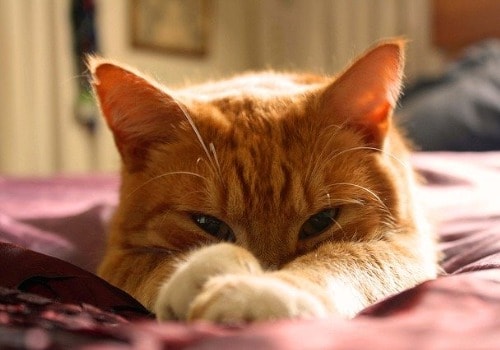
Whether they are sleeping at night or during the day, you can learn much about your cat by the position she is in while napping.
Incognito: When your cat curls up and tucks her little face between her paws and her tail, she is telling you she is not to be disturbed while resting. If your cat still has her talons, she may poke or scratch at you if you try to pet her or wake her while she in this position.
On Their Backs, Belly Up: The belly is one of a cat’s most vulnerable areas on its body and one that she instinctively protects. If your cat rolls over on her back, it is a sign that she fully trusts you, but also feels the need to test that trust.
Whenever you see a cat on its belly, you may have an irresistible desire to rub or pat that furry belly. However, if your cat is resting in that position, she may not want to be disturbed and if you pet her belly, she may jump up scratching, so it is best to leave her be, regardless of how tempting it is.
Stretched Out on Her Side: This position tells you your cat is at her most relaxed and feels completely safe in her environment. She has no need to be on guard or aware of her surroundings and can sleep in peace.
Cats most often get into this position to get a deep sleep. If you see her twitching, it just means she is in the human comparison to REM and you should not disturb her.
[amazon bestseller=”cat tree”]
Final Thoughts on Sleeping Cats
Every aspect of a cat’s motions and positions says something about your cat. Whether she is awake or asleep, it is best to know what she is saying. You may start to feel at times that your cat owns you and not the other way around.
To some degree, that may be true and not just a myth. In some respects, your cat adopted you just as much as you adopted her. Just as a human has his or her own personality, so does your cat. Your cat may see you as her equal, not as her owner, and as you become more experienced in reading your cat, you will live together rather peacefully, even when she is sleeping at the foot of your bed.
"In ancient times cats were worshipped as gods; they have not forgotten this."
-- Terry Pratchett



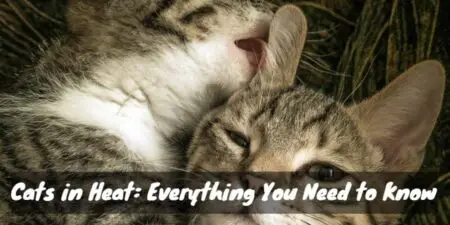

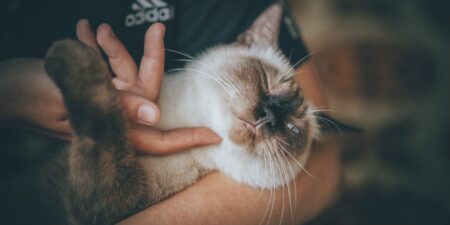
My cat sleeps beside me by my head
I have a ginger fur baby boy and he is so loving he dosent give head butts like my other cat but he shows his love in another way… except he always sleeps at my feet and at the middle of the night i will pick him up and bring him closer but he will just walk back
Do you maybe know why??…
Your answer is in the article
Awesome thanks…
The article is really good, thanks for sharing!
I loved the article – my cat will make it to bed before I do.